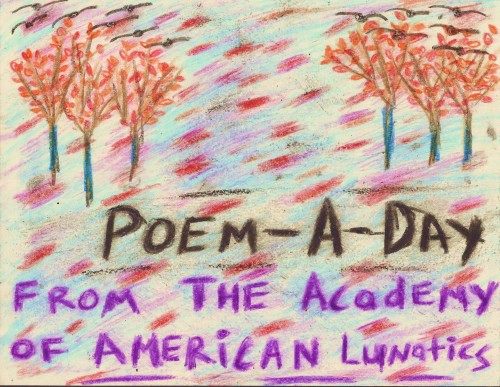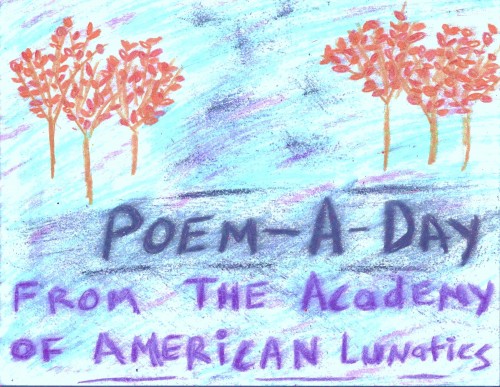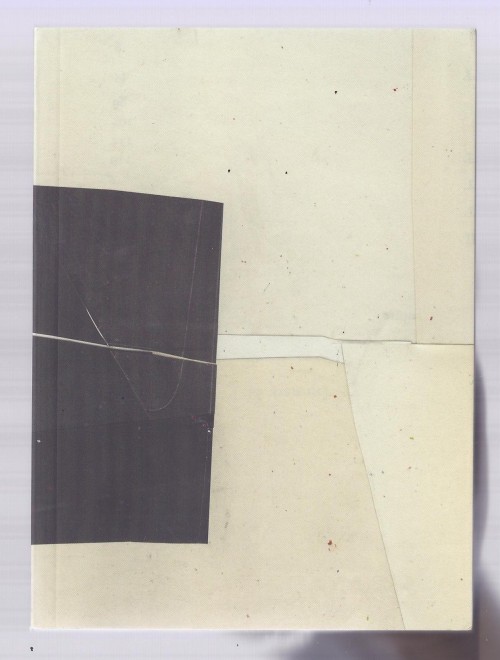Seattle’s Cheese & Wine Poetry Community / The Cult of Henry Darger / etc / etc / (talking with Rebecca Loudon)
Rauan: Seattle’s a polite town. Everyone’s super polite, cordial, in a way, cool in their dealings. But not so warm all the time. Seldom even maybe. What do you think of this? And do you think Seattle’s writing (poetry, etc, whatnot) suffers and/or benefits from a similar sort of politeness? Coolness?
Rebecca: Seattle used to be considered a “friendly” town but Seattle grew up and is now a Big City. Seattle suffers from a kind of passive/aggression. I’ve seen people at six way stops get out of their cars and start fighting over who goes first. We also have a lot of homeless displaced people here but they are mostly ignored or hidden so the city will look prettier. Seattle is famous for leading the way in cutting down its carbon footprint but the city’s largest private employer makes airplanes. No one (at least publicly) acknowledges how jet fuel which emits carbon dioxide and other greenhouse gases into the atmosphere at an alarming rate contributes to the acceleration of global warming. And yet you can no longer get paper or plastic bags at Seattle stores because it’s bad for the environment.
Seattle writers are friendly among themselves those writers who write similar poems those writers who are polite whose poems are polite whose work doesn’t take risks whose poems are widely published in polite poetry journals. It’s an easy place to be a poet. You can’t swing a contrabassoon without hitting a poetry reading in Seattle. This city has supported poetry on buses poetry readings for the city council poetry readings in museums and offers all kinds of grants and opportunities to poets who write polite non-threatening poetry. Sometimes Seattle gets lucky and brings in outside poets to read but mostly it’s the same circle of poets making the rounds being passive aggressively nice with their nice natural fiber clothes their hybrid cars their little hemp bags in which to put their shopping and their polite nice poetry.
*****
*****
Okay, so that was the first part of my latest Seattle Author Spotlight, the 11th, featuring Rebecca Loudon. Several years I did an interview with Rebecca regarding her excellent book Cadaver Dogs (which you can read here, it contains info about her being a violinist as well as some of the very personal elements of that book) but this time I had the pleasure of meeting Rebecca in person. Rebecca claims to be a sort of hermit, but we got along great, intensities coming and going. And Rebecca’s work as I’m finding out is getting stranger and stronger READ MORE >
November 5th, 2013 / 10:52 am
POEM-A-DAY from THE ACADEMY OF AMERICAN LUNATICS (#2)
by Seth Abramson
This is a world where there are poets
There are poets everywhere, neo-formalists and conceptualists
There are poets on Twitter, there are poets in my bed.
There is one poet. She is my little one.
I talk to my little poet.
I give my little poet some Stevia but that does not satisfy her.
I tell her, ssh ssh, don’t growl little poet!
And she growls, oh boy does she growl!
And she wants something from me,
She wants my soul.
And finally giving in, I give her my gleaming soul
And as she eats my gleaming soul, I am one with her
And stare out her eyepits [sic] and I see nothing but white
And then I see nothing but fog and the white I had seen before was nothing
but fog
And there is nothing but fog out the eyes of poets
![]()
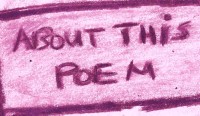 When I was six or seven, I skinned my knee. It’s an experience that’s never really left me. This is a poem about that. And the magic of poetry. It’s called “Ars Poetica,” which means “small gift” in Latin. This poem owes a significant debt to Dottie Lasky and also to the magic of poetry.
When I was six or seven, I skinned my knee. It’s an experience that’s never really left me. This is a poem about that. And the magic of poetry. It’s called “Ars Poetica,” which means “small gift” in Latin. This poem owes a significant debt to Dottie Lasky and also to the magic of poetry.
![]()
note: I’ve started this feature up as a kind of homage and alternative (a companion series, if you will) to the incredible work Alex Dimitrov and the rest of the team at the The Academy of American Poets are doing. I mean it’s astonishing how they are able to get masterpieces of such stature out to the masses on an almost daily basis. But, some poems, though formidable in their own right, aren’t quite right for that pantheon. And, so I’m planning on bridging the gap. A kind of complementary series. Enjoy!
November 4th, 2013 / 12:01 am
POEM-A-DAY from THE ACADEMY OF AMERICAN LUNATICS (#1)
A Good Titty Is Hard To Find

Reb Livingston has amassed 2250 Facebook friends, 876 Twitter followers, 625 Google+ circle inclusions, 568 Goodreads friends, 309 Pinterest followers, 234 LInkedIn connections and has been awarded an impressive 60 Klout score. Upon turning 40, Ms. Livingston was unanimously declared the champion of the Male Series of Middle Aged Poets, the first woman to achieve this honor since the award’s inception in 1919. She resides in Northern Virginia with her husband, son, dog and a solitary fish named Wolverine who just won’t die.
by Reb Livingston
O if I had two titties to rub
together I would rub them
together until together they
created one good one
and I’d strut around with
my one good titty
that I’d push up with my firm palm
imagining that it was your firm palm
and I’d keep it in place with packing tape
imagining that it was your packing tape
and eventually my one good titty
would spill over
my custom one-tittied tape bra and
disappear into my scoop neck crop top
but before it did
I’d use my one good titty to pound your face
like my titty was some soap in a sock
participating in a retribution
my sweetness, please, give my one
good titty, a little more time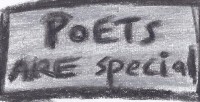
to settle and
stretch into a lithe hand of delight.
![]()
 One morning I woke up very sad. So I decided that since I was a poet, I would express my sadness in poem form. This poem explores the concepts of friction, combination, sexuality, gender, aging, gravity, fashion, metamorphosis, violence and love. The titty works as metaphor for a much larger idea.
One morning I woke up very sad. So I decided that since I was a poet, I would express my sadness in poem form. This poem explores the concepts of friction, combination, sexuality, gender, aging, gravity, fashion, metamorphosis, violence and love. The titty works as metaphor for a much larger idea.
October 28th, 2013 / 12:25 pm
I’m a Bad Feminist, etc – (Talking with Seattle’s Amber Nelson)
Rauan: When we chatted you used the word “Feminist” a few times. “Feminist,” a word that puts me on edge, and sometimes gets me crossing my legs, etc, because, well, some Feminist writers are quite radical (knife carriers probably). Can you tell us, plz, what Feminism means to you and explain about your being, as you said, a “Bad Feminist”?
Amber: I have to admit that your response to the word “Feminist” gets my hackles going…
Much like admitting to being a writer, more especially a poet, took some work on my part—it was something I, and I think most people, had to learn to admit or choose not to admit. I had to decide to admit to being a feminist because it garners exactly your reaction: that feminism means “man-hating.”
I think feminism, the truth of it, is and should always be equality for all–humanism. But there are varying levels and kinds of feminists. And there are thousands of road blocks, including a long history of white male privilege. That’s not an accusation, but a truth.
And so I point you to this essay by Lindy West (also a Seattle local and fantastic writer).
That said, I often worry that I am part of the problem. That I am a “bad feminist.” I worry because there are lots of things that I enjoy that are clearly problematic at best, or misogynistic and rapey at worst. I wouldn’t say these are the qualities I like about them… but they do exist. Take, for example, and since it’s hot right now, the Robin Thicke “Blurred Lines” song. (It’s gotten a lot-o-press.)
I get that the lyrics are evil, but man does that song make me want to dance.
That’s why READ MORE >
5 Points: Whittling a New Face in the Dark (by DJ Dolack)
1) As you can see the cover of DJ Dolack’s just-released, debut collection of poetry, Whittling a New Face in the Dark (Black Ocean), has no text on the front cover (or the back, for that matter) and this is something DJ fought hard for. And that’s one of the great things about publishing a book through Black Ocean: the back and forth between publisher and author involves friendly fighting.
Yes, I speak from experience when I say that Black Ocean dialogues with authors on things both big and small. And this leads to much improved books.
2) DJ’s wonderful book comes at you, easily, like a parade (or procession) of Edward Hopper paintings rusting in strange twilight. Or the scenes from a moody Western, a northern, winter Western, dark-pale trees, bleak ice—hard-bitten characters staring out from and through the insistent and persistent landscapes.
3) this is page 19
Grandfather is alone in the yellow house
with the flea market pistol. READ MORE >
October 25th, 2013 / 10:33 pm
An Interview with Sean Thomas Dougherty
I first met Sean Thomas Dougherty at my first AWP conference, Denver 2010. I had been wandering the overwhelming aisles of the Book Fair, wondering what I had gotten myself into, when I found myself at the BOA table. A book called Sasha Sings the Laundry on the Line caught my eye. That mesmerizing title with the Eastern European name, the cover art of colorful dresses and towels hanging between sooty apartment buildings, a wedge of blue sky above – it reminded me of my old neighborhood of Midwood, Brooklyn, and when I picked up the book I read the name. This was a guy whose poems I had long admired, and I hadn’t realized he had a new book out. When paying for Sasha, the BOA rep behind the table asked, “Would you like Sean to sign it?” I told her I needed to get going, but then she pointed behind me: reddish hair under a cool hat, big hooded sweatshirt, pale blue eyes, warm smile: Sean Thomas Dougherty. Signing his book, Sean wanted to know my story right away. He lit up when I told him I was a college dropout. “You’ve got to put that in your author bio,” he said.
Sean and I have kept in touch since Denver, mostly via email and Facebook. Sean is hands-down my favorite Facebook presence. His barbs at mediocre poetry, his posts of music videos on his “Punk Rock Sundays,” and his constant promotion of indie magazines and presses, as well as of the poets he loves, is something I look forward to daily. When I heard Sean had a new book in the works, I contacted him about doing an interview. That book, Scything Grace, is now out with Etruscan Press. Dougherty’s poems sing of the tough realities of American city life, with a voice influenced by Lorca and Vallejo, Levis and Hull, but a voice truly all his own. He draws close the lives and deaths of those he loves, and sees and hears the stories of the American poor and working class all around him. His poems from the beginning have challenged the division between poetry and prose, and are loyal to nothing if not sound, and great feeling. Poet Dorianne Laux has written that Dougherty is a poet “of grand and memorable vision . . . the gypsy punk heart of American poetry.”
In the following interview, conducted via email over a few days last May, Sean and I discuss Scything Grace, the line versus the sentence, Li-Young Lee, and the duende.
***
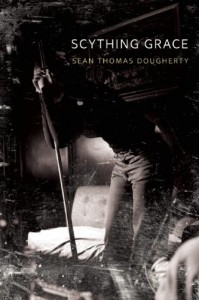 Justin Bigos: Your latest book of poems, Scything Grace, shows you continuing to push the formal possibilities of your poetry, as well as hitting what I hear as a more recent note in your work: the voice of an older, more self-aware poet, who carries his ghosts through the streets and witnesses language and song everywhere, as if the world were scripting itself, singing itself daily into existence. Can we start our conversation by looking at this book as the next chapter in your life’s body of work? How have you changed as a poet since Sasha Sings the Laundry on the Line?
Justin Bigos: Your latest book of poems, Scything Grace, shows you continuing to push the formal possibilities of your poetry, as well as hitting what I hear as a more recent note in your work: the voice of an older, more self-aware poet, who carries his ghosts through the streets and witnesses language and song everywhere, as if the world were scripting itself, singing itself daily into existence. Can we start our conversation by looking at this book as the next chapter in your life’s body of work? How have you changed as a poet since Sasha Sings the Laundry on the Line?
Sean Thomas Dougherty: This is a hard question for me because I haven’t really “read” Scything Grace yet. It is an improvisatory collage. So I will answer in an improvisatory collage, which is the way I’ve started to write more and more in the last decade. The way closest to how I think, how I feel.
Back in May 2012 I was walking with my friend the poet Corey Zeller at the park on the west side of Erie, Pennsylvania, where I take our children to run through the last cherry blossoms. Pale petals we are. Sometimes when I walk I will just start talking to Corey poems and he will say, write that shit down. And I say, no one time. The poem is now gone. I’ve been doing this for decades for my friends. I say I am a walking saxophone. I say I am the words hiding all around us. Monk once said he has a hard time not hearing the music, it is everywhere, he wants to reach up and catch it as it passes us by. Flea, the bassist from Red Hot Chili Peppers, says the same thing. Everything has a beat. Think of a billion living things, the smallest insects. Human hearts. The rush of traffic. A swallow’s wings sing the air. I actually “write” very little all year. I write maybe two months and then the rest of the time I live, I collect, I listen, but I say poems all the time. I think part of being a poet is to live the poem, so I spontaneously make poems for the people I care about. I make poetry part of the fabric of us.
In May 2012 I had just finished a grueling grind-out manuscript for BOA of my Selected Poems to appear in 2014. Some of the poems in there I had been crafting for over six years. Corey’s best friend Jeremy, who I had known for years too, had just hung himself. Corey was dealing with his death and trying to write poems in his voice. It was spring. We walked carrying such weight. My love Lisa was very sick. My second daughter had been born in January. My oldest, Amara Rumi, was four. She ran with Corey’s son Malcolm. To live in a city of rust along a lake between nations. Our children are a lake between nations. Corey said now that you have finished your Selected you should write a book the way you speak poems. Just riff them fast. But write them down.
I said, yeah like Sonny Rollins playing with the birds on the Williamsburg Bridge. Legend has it when Rollins felt stuck he spent a year listening and playing with the birds on the bridge. He disappeared into life to find a new sound, a new tone. I needed to find a new tone. To return into the improvisatory language that drove me to poetry thirty years ago. For decades I’ve been pulled into the river. Now I gave myself permission to not swim but drown in it. I was also interested in writing much shorter lyric poems. My love Lisa is very sick and her favorite poems are my shorter lyric poems.
So two very important people in my life pushed me to make this book of short improvised lyrics. Then I expanded the breath to close. It is a Book of Breaths.
I started with a quote from Cavafy. In many ways the entire new book Scything Grace was driven by these lines from Cavafy’s poem “The City” :
“…I see the black ruins of my life, here,
Where I’ve spent so many years, wasted them destroyed them totally.”You won’t find a new county, won’t find another shore.
The city will always pursue you.
I wrote 80 percent of Scything Grace in a sort of old school improvisatory haze fueled by the duende, black coffee, and cigarettes over four weeks in May 2012. After I was done, I hit spell check, told my friends I was sending it out. It was done. I wrote it linearly one poem after another, day after day, sometimes two or three poems per day. I sent it out on a Saturday night in late June, I think, to Four Ways Books, Etruscan Press, and Black Ocean Books. On Monday afternoon Phil Brady of Etruscan called me up ecstatic to accept it.
JB: I’m really interested in how you articulate some of the paradoxes of the poem – at least the kind you write and are drawn to – especially the paradox of the poem as something received yet also made. It is you, Sean Thomas Dougherty, writing these poems—but as a kind of conduit, a witness. In that sense, the writing seems less about arranging sound and experience than transmitting it. If this is true, how do you know when to improvise, when to guide, when to allow your own will in there to have its say?

STD: You can’t teach someone to make metaphors, but you can teach the structure and examine how they are made or why certain images arise from the imagination, the way the French phenomenologist Gaston Bachelard in his profound book The Poetics of Space points to rooms, windows, doors, spaces intimate and grand, the juxtaposition between things, between worlds. But in the end there is an unnamable space to the making, that is the human spirit, soul I dare say, history of language and learning, the imagination made manifest in words. But it is also the body. The body remembers. So while the mind may let go the body becomes an instrument of sight, and very particular for the poet, of sound.
Laura Sims’s Practice, Restraint
Since my mommy purchased me Laura Sims’s collection of poems, Practice, Restraint, I have read it more than five times.
The poems are small and tiny. They hardly take up any space (although they do take up some space, of course). The lines leave room for few words; some, like the commencing verses of “Bank Twenty-Seven,” only hold one or four:
Trees over here
Over there
In one empty classroom
The girl is turning
The town inside out
Such sparseness spotlights the empty white space, which I like; it’s as if the few words of Laura’s poems are speaking to the empty white space, acknowledging that the empty white space isn’t really empty white space, rather, there’s something in it, the way an abandoned house at the end of street isn’t really abandoned, since ghosts live there.
Many of these poems pertain to scariness. There’s empty classrooms, empty rooms in general, trees, dead things coming out of mountains, a house that shines, and a girl in marsh. Each of these listed things could contain ghastly properties.
In the empty classrooms there could be girls getting ready to launch a school shooting because they were teased for not being capable of applying makeup correctly.
The house that shines might be doing so due to a bright apparition that resides in there and effects itself each night when it causes some kind of chaos.
Violence is a part of the poems. Laura compares girls’ “shining eyes” to “shiny new bullets.” She also remarks, “so many / dead girls / in this shit-hole.”
Though girls aren’t boys, they can still carry out violence, like Valerie Solanas did, like Mary Tudor did, and like the Jawbreaker girls did.
Some, like former secretary of state Colin Powell, believe overwhelming force is the best way to be violent. Others, like insurgent Muslim boys, believe a tiny and almost hidden force is better. The sensibilities of Laura’s poems align with the latter; just because you’re not doing lots of things and taking up lots of space in plain sight doesn’t mean that you’re not powerful.
Baby Marie-Antoinette Opens Up Upon Simone Weil, Gang Rape, and More
Last week, I published a tiny story by Baby Marie-Antoinette, one that was titled Gang Rape Me Now Please.
Then, last nighttime, while the world acted woeful (as usual), Baby Marie-Antoinette sent me a telegram, telling me that she had things to say to me.
When a girl who, at less than 42 months, already has a biopic starring the striking Kirsten Dunst wishes to say things to you, then obviously you heed that.
That’s what I did.
In a vintage skirt (because boys can clad themselves in skirts) and a St. Louis Cardinals sweater (because they’re the best baseball team ever, and the LA Dodgers are gay), I met Baby Marie-Antoinette (as well as her mommy) at a McDonald’s in Midtown.
Baby Marie-Antoinette munched on a vanilla ice cream cone. I did the same.
BMA (Baby Marie-Antoinette): Thank you very much for meeting me.
Me (M): You’re very welcome.
BMA: My mommy articulated that it’d be agreeable if I articulated further about gang rape and such, and I agreed.
M: K…
BMA: So… you should probably inquire further…
M: Why are you so struck by gang rape?
BMA: I don’t believe in autonomy, freedom of speech, freedom in general, liberty, individual rights, or any such stuff.
M: Why?
BMA: I am Catholic. I absolutely believe in God, as God will make it so that I am the Queen of France. God cares for me. Another girl who God cares for is Simone Weil. She is a French girl who is sort of looked down upon because she didn’t spend her nights at white people bars on the Lower East Side.
M: What does that mean?
BMA: She didn’t got nuts for the human body or anything that humans nowadays (or in the olden days) deem progress. In Simone’s notebooks, she states, “We possess nothing in this word other than the power to say ‘I.’ This is what we must yield up to God.” For Simone, all the rights that people are roaring for are abhorrent. They are as unheavenly as a croissant without warm cherry cream in the center. According to Simone, “The self is only a shadow projected by sin and errors which blocks God light.”
M: So even though America says the self is the splendidest form ever; really, it’s sordidness.
BMA: Uh-huh. So when the self is destroyed, and when the attributes attributed to selfhood are tossed into the trash, it’s not naughty for God, it’s naughty for the ideologies that promulgate free personhoods.
M: Like the United States of America.
BMA: That’s a country that’s corrupted by personhood. In Gravity and Grace, Simone says, “We have to be nothing in order to be in our right place.” But Americans advocate the antithesis. They try terribly hard to be something, which is why they talk so much, eat so much, spend so much, and make so much trash.
M: But really, this “something” isn’t “something”; really, this “something” is “nothing,” only a different kind of nothing than what Simone is referring to, as it’s a nothing that has nothing to do with God, and thus it’s meaningless.
BMA: Sigh.
M: So why does 24/7/365 gang rape stay on your mind?
BMA: Because with gang rape it’s boy after boy being utterly uncaring about your body and what you yourself want to do with it. Simone says in her notebooks, “The more I efface myself, the more God is present in the world.” I could try to terminate myself, but that seems so self-involved, so I’d rather have boys do it. According to Simone, “When the ‘I’ actually is abased, we know that we are not that.” I know that my body is not nice. A pink and fuzzy Miu Miu coat is nice. But flesh, like Simone says, is “vile.”
M: Maybe the reason why gang rape is regarded as one of the top revolting behaviors in the world is because so much of the world cares about their bodies and not about God.
BMA: Uh-huh, people nowadays seem to be invariably promoting themselves, especially on Twitter, Facebook, Instagram, and any other gay social media platform designed by California loser. Simone says, “There is a lack of grace with the proud man.” Does Sheryl Sandberg possess grace? No. She’d likely be really upset if boys gang-raped her.
M: But what about those who equate !@@$% with purity?
BMA: These types should read John Milton’s play, Comus.
M: I read that play while I ate a chocolate cupcake.
BMA: My mommy read it to me while I ate a raspberry cupcake.
M: It’s about a girl who’s lost in the woods and is danger of being raped by a monster.
BMA: But even if the monster did rape her, it couldn’t corrupt her, because her purity isn’t positioned in her skin.
M: Perchance this is why Baby George III says Sasha Grey is more religious than Adrienne Rich. Baby George III saw Ariana Reines’s lecture at NYU a while ago, and during the question and answer, she compared Jesus to porn starlets, since both are renown for being transfixed by myriad external elements.
BMA: Perchance… The reason why gang rape is regarded as it is is because the world is wrought with utterly unthinking ungracefulness.
This is when Baby Marie-Antoinette asked her mommy to purchase her another vanilla ice cream come.
…………Crispin Best………….
***
I am very pleased that Crispin Best is my 4th U.K. Spotlight. I’ve enjoyed just about everything I’ve seen or read of his. I am, simply put, a real fan. His tweets are a Ferrari. His website‘s a garage full of Lamborghini (samples of his excellent writing). And his Tumblr is one snazzy racing car after another. (what’s with all the sports car references?? — well, it’s between me and Crispin, eh!).
Crispin’s answers to my questions (my questions steeped in cutesy, showoff puffery and fluff) surprised me a bit like tender marble footsteps fit to baptize or decapitate a king and which knock (knock-knock) like a bronze Beowulf boat against his online personas which are so heroically abrasive (“hi, assholes“- etc), lovable, zany, magnetic, full of swagger and energy.
but, blah, blah, anyways,
.. here’s our interview, which you’d better enjoy! (assholes!)
***
Rauan: which would you rather be called: a “digital Ashbery” or a “Tumblr Catullus” (nothing i’m guessing with “Larkin” in it)? and what truth would there be in either ? (and plz elaborate like we’re at a party in Brooklyn, leaning against a fridge. or between two trees on a summery day in Oxford. Or in a pit. Anything.).
Crispin: i do know an old story about don barthelme telling his writers-blocked student to drink a bottle of red wine and spend all night writing imitations of ashbery, phoning at 4am to check up on them, and how that helped the student. i feel a strong, sad warmth towards don barthelme at all times, but particularly when i think about that story. i like the sound of a tumblr catullus. that seems appealing. mostly i’m happy to be alive. it’s hard and it’s hell but it’s good.
[ the Senor Frogs T-Shirt, fyi, was a shrewd $2 purchase in Tokyo ]
***
RK: beyond your excellent crude and funny persona(s) you seem able to find and show in your heart many beautiful READ MORE >
Gang Rape Me Now Please: A Tiny Story By Baby Marie-Antoinette
 A little bit ago, like a couple of nighttimes past or so, Baby Marie-Antoinette, the second Bambi Muse baby despot, sent me Gang Rape Me Now Please, a tiny story she composed.
A little bit ago, like a couple of nighttimes past or so, Baby Marie-Antoinette, the second Bambi Muse baby despot, sent me Gang Rape Me Now Please, a tiny story she composed.
She sent it through mail, not the kind that everybody today uses, but the kind that Lorine Niedecker and Louis Zukofsky used.
Being a boy, gang rape isn’t really applicable to me. So I sent the tiny story to a girl, or, to be more precise, a ghostly girl, as the girl was Helen Burns, Jane Eyre’s BFF.
Helen said that the tiny story unveils the utter unpleasantness of autonomy, consent, individuality, basic human rights, and so on.
Helen went on to say that Baby Marie-Antoinette’s story was much more Godly than America will ever be, and it’d be wonderful to share it, as 2013 earth needs God.
Heeding Helen’s counsel, here is Baby Marie-Antoinette’s tiny story, Gang Rape Me Now Please:
Once upon a time there was a French princess named Baby Marie-Antoinette.
Baby Marie-Antoinette liked mice, cherry cream cheese croissants, Disney princesses, and Christianity.
Baby Marie-Antoinette also liked boys.
The boys in the Disney movies are heroic and dashing. They sail the seas (like Eric) and they save each other from impending doom (like Buzz Lightyear and Woody).
But the boys on 2013 earth were the opposite. They were nice, accommodating, and laid back. These average attributes caused Baby Marie-Antoinette to scream, “Ugh!”
One day Baby Marie-Antoinette was able to escape the clutches of her mommy, Empress Maria Theresa, and venture out into the Big Apple, searching for grandeur, extremeness, gang rape.
Baby Marie-Antoinette approached a bald boy with a big nose. She asked him if he’d gang rape her.
The boy declined, politely introduced himself (it turns out his name was Lloyd Blankfein), and asked Baby Marie-Antoinette if her mommy would be interested in purchasing some collateral debt obligations (CDOs).
Baby Marie-Antoinette shook her head. Then she approached another boy. The boy paired pink jeans with an ironic sweater. Baby Marie-Antoinette asked him if he’d gang rape her.
This boy declined as well, explaining that he was a feminist in the middle of shooting a Kickstarter-backed documentary about gender inequality.
Baby Marie-Antoinette sighed. Realizing that the chances of her meeting a big, bold, bullying boy were highly unlikely, she found her way back home, crawled under her Tinker Bell blanket, and cried.



